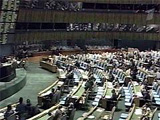|
|
TODAY.AZ / Business
UN body thaws caviar trade freeze for Iran, but maintained it for Azerbaijan
12 April 2006 [14:59] - TODAY.AZ

The Convention on International Trade in Endangered Species (CITES) approved exports of up 44,370 tons of caviar from Iran.
Tehran had sought a trade quota of 50,805 tons, but the CITES approval only covers eggs produced by the Persian sturgeon, one of the five species fished by Iran's caviar industry. "It's the only species which isn't doing too badly in the Caspian Sea," David Morgan, head of CITES scientific division, said.
The UN body maintained its ban on caviar from the rare Beluga sturgeon, which is prized by gourmets.
Every year, CITES asks caviar producing countries for a quota for the following year's catch. The body, which groups 169 countries, said in January that it could not approve the 2006 quotas proposed by major exporting nations, saying that they "may not fully reflect the reductions in stocks or make sufficient allowance for illegal fishing".
CITES said on Wednesday that it was continuing its overall freeze on exports by the other Caspian Sea nations: Azerbaijan, Kazakhstan, Russia and Turkmenistan. They had failed to come up with satisfactory quota proposals at a recent meeting, which were needed if they were to be allowed to restart the money-spinning commerce, Morgan explained. CITES is unlikely to grant them approval at all this year, he added.
"It's unfortunate not have been able to come up with sustainable quotas," he said. "It was the last chance."
CITES first imposed caviar trade controls in 1998, after a decline in sturgeon stocks following the break up of the Soviet Union. Fishing increased after the end of communist-era restrictions, raising fears among environmentalists that sturgeon would be wiped out.
CITES has persistently pressed Caspian Sea governments to crack down, pointing in particular to mounting illegal fishing which it has said could be many times greater than the legal catch.
The Caspian is the source of 90 percent of the world's caviar. It was already hit with a temporary ban in 2001.
/Middle East Times/
URL: http://www.today.az/news/business/25062.html
 Print version
Print version
Connect with us. Get latest news and updates.
See Also
- 10 February 2026 [12:21]
G-77 and China Group hold plenary at UNESCO under Azerbaijan's chairmanship - 10 February 2026 [12:01]
Azerbaijan launches unified digital platform to transform internet services market - 10 February 2026 [10:22]
South Caucasus and Central Asia hold strategic importance for U.S. companies - 10 February 2026 [09:46]
Company registration in Azerbaijan: What entrepreneurs should know before starting - 09 February 2026 [15:42]
Azerbaijani products showcased at int'l exhibitions in Beijing - 09 February 2026 [13:21]
Azerbaijan Cybersecurity Center trains over 380 specialists - 08 February 2026 [21:12]
Georgia seeks to boost regional transit role with major infrastructure push - 07 February 2026 [19:50]
Iran plans to link Ardabil railway to Azerbaijan and Central Asia - 07 February 2026 [14:41]
Azerbaijan’s imports from Türkiye fall in January as historical trend shows fluctuation - 07 February 2026 [12:36]
Private investment key to long-term sustainability of Middle Corridor
Most Popular
 West Azerbaijan Community addresses US Vice President ahead of Azerbaijan visit
West Azerbaijan Community addresses US Vice President ahead of Azerbaijan visit
 Nakhchivan railway project to benefit Azerbaijan and European Union
Nakhchivan railway project to benefit Azerbaijan and European Union
 JD Vance heads to Caucasus — What Washington hopes to achieve
JD Vance heads to Caucasus — What Washington hopes to achieve
 Iran takes hard line on protest detainees, excluding them from amnesty
Iran takes hard line on protest detainees, excluding them from amnesty
 Zelensky: US seeks Ukraine-Russia deal by June
Zelensky: US seeks Ukraine-Russia deal by June
 Ukraine imposes new sanctions targeting Russia’s defence and financial networks
Ukraine imposes new sanctions targeting Russia’s defence and financial networks
 Syria arrests security officer after deadly shooting in Suwayda countryside
Syria arrests security officer after deadly shooting in Suwayda countryside
